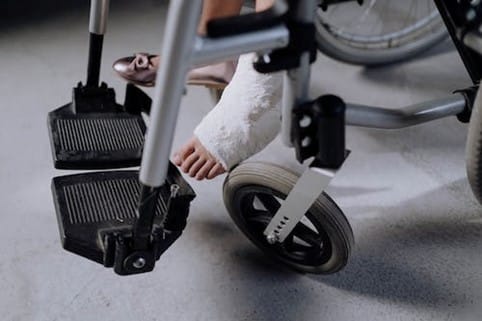What Is Involved In An Orthopaedic Negligence Claim
Orthopaedic surgeries, including joint replacements like hip, knee, or ankle, are routinely conducted in Irish hospitals with a high rate of success. Nonetheless, errors can prove to occasionally occur. The most frequent orthopaedic claims arise from mistakes made during surgery involving hip replacements or procedures involving the lumbar spine. There is also the potential for fractures to be overlooked by a doctor, leading to unnecessary pain and potential irreversible harm.
Orthopaedic claims can stem from the following medical errors:
- Failing to diagnose a fracture following an x-ray.
- Neglecting to arrange an x-ray for a fracture.
- Incorrect placement of screws or plates.
- Nerve damage injuries during surgical procedures.
- Inadequate repair of fractures.
- Occurrence of infection development post-operatively.
- Insufficient post-operative care leading to wound infections.
- Complications during ankle, knee, or hip replacement surgeries.
- Improper installation of a prosthesis (such as knee or hip replacements), which involves inaccuracies in sizing.
(Note: this is a brief listing, if your injury is not listed and you are questioning your viability of your claim, contact a member of our medical negligence team to ensure that it qualifies for adequate legal action.)
The outcomes can vary based on the damage’s severity. Patients might fully recover quickly or experience persistent challenges like enduring pain, suffering, and disability. Potential outcomes encompass immobility, walking challenges, severe pain, and diminished sensation stemming from nerve or blood supply impairment. This unfortunate circumstance can disrupt work, studies, self-care, and daily routines. Subsequently, additional medical procedures and therapies could be deemed necessary to partially or entirely recovery from the consequences of orthopaedic surgical negligence.
All You Need To Know About The Process Of Making A Claim
Initiating a claim might seem overwhelming and demand a significant amount of time and effort. When considering orthopaedic injury compensation claims, it is crucial to prioritise your well-being as the primary concern. Orthopaedic medical negligence claims are pursued in legal avenues such as the Circuit Court or the High Court.
It is imperative that we establish the substandard quality of care in the orthopaedic treatment you received before taking any legal action. This is established by seeking input from an orthopaedic expert outside your jurisdiction, who evaluates your records and offers their professional evaluation. Once robust expert evidence is obtained, we move forward with commencing legal proceedings in the appropriate court and serving them on the responsible party, which could be the healthcare provider.
From the very first interaction with our solicitors, we will attentively and empathetically listen to your situation. We proceed with advice on pursuing the case only when its validity is determined. With an amalgamation of legal expertise and a genuine comprehension of the practical challenges encountered by individuals and families following such incidents, our solicitors seamlessly handle the entire process on your behalf. This encompasses gathering essential case details, including medical records, and overseeing the submission of your medical negligence claim.
Entrusting our expert medical negligence team to manage your claim enables you to concentrate on the utmost priority, your recovery and personal well-being, or that of the individual involved.
Visit Contact Us | Tracey Solicitors LLP to initiate your claim or ask us any questions you may have regarding your case. Our proficient medical negligence solicitors are always willing to help our clients on their road to recovery, provide them with expert advice and ensure they are receiving the legal assistance they deserve.
Evidence Required To Make An Effective Claim
Filing an orthopaedic claim for compensation is more complex than merely presenting your account against a registered professional or company. As the plaintiff, you must prove that medical negligence caused your injuries, excluding any other underlying factors. To initiate an orthopaedic claim, you’ll need the following documentation:
- Medical Records: Your solicitor and an independent specialist will carefully review your medical records where negligence is suspected regarding the medical care you received. They will evaluate the treatment’s quality and identify any errors causing orthopaedic injuries. If negligence is established as the cause of recorded injuries, an expert will gauge their severity and potential life-altering impact.
- Injury Severity Assessment: Expert analysis of the extent and potential life-changing impact of the injuries sustained. A professional will assess your condition and predict your recovery timeline.
- Causation Proof: Establishing a clear link between the negligence and the orthopaedic injuries sustained.
- Personal Statement: A comprehensive statement detailing your care journey and pinpointing the error’s location. It should highlight the injury’s effect on your daily life, as per your knowledge.
- Witness Statements: Statements from colleagues, friends, or family who have witnessed your injury’s direct impact on your daily life can significantly contribute to a fair hearing.
This information is vital prior to advancing with compensation claims. Before finalising any claim, understanding the full scope of injuries and their future prognosis is crucial. Your solicitor will exert pressure on the opposing party to promptly file court documents and respond to correspondence, expediting the claim process. Once legal proceedings are initiated, the case may take around 2-3 years to reach court for a hearing. The timeline depends on case complexity, the necessity of multiple experts, and the defence presented by the healthcare provider. Obtaining early legal assistance is vital due to the strict time constraints in place for initiating legal proceedings.
Time Restraints To Be Aware Of Before Filing A Claim
It is highly recommended to contact an experienced solicitor from our medical negligence team as soon as possible after the incident as this increases the chances of a successful outcome for your case. Our solicitors can provide expert guidance, assess the viability of your claim, and often offer a consultation to address any concerns you may have.
However, it is important to note that there is a specific timeframe in Ireland within which you must initiate legal proceedings. Anyone intending to pursue a medical negligence claim through the legal system must do so within a two-year period from either the date of occurrence of the error or from the moment you became aware of the mistake that resulted in your current condition. While the impact of orthopaedic medical negligence might not be immediately evident, the two-year timeframe often applies. Consequently, the two-year limit can commence from the moment you notice symptoms, sustain a significant injury, or uncover evidence of malpractice.
Regarding minors, the time limit begins once they reach 18 years of age, granting them until their 20th birthday to initiate legal action. Parents with legal authority are permitted to initiate a claim on their behalf before the child reaches adulthood. Furthermore, the Mental Capacity Act 2005 allows the filing of a claim for an adult who is incapable of acting independently.
If you’re uncertain about your position, make a call to a member of our medical negligence team to achieve clarity as soon as possible.
Calculating Compensation Expected To Be Received For Orthopaedic Negligence Claims
The time it takes to resolve medical negligence claims varies due to a multitude of factors. While it’s challenging to provide an exact estimate, most claims are typically finalised within an average span of two to three years. Throughout this process, our adept medical negligence team will sustain clear and open communication with you.
Given the circumstances that inadequate orthopaedic care has resulted in your suffering, you may have the opportunity to seek compensation from the relevant hospital. An initial consultation with our team can offer an evaluation of your circumstances and guide you through potential courses of action. The complexity of orthopaedic claims can impact their resolution. The strength of each claim relies on the severity of the personal injury. For instance, if a medical report indicates a year or more for complete recovery, the court may choose not to expedite the case.
Compensation claims stemming from orthopaedic surgery negligence encompass two primary areas of loss:
- Enduring pain and emotional distress arising from the injury.
- Tangible expenses incurred as a result of the injury, encompassing immediate costs like transportation, accommodation, and medical treatment, as well as foreseeable future expenses such as ongoing physical therapy and care.
It is vital that you follow the appropriate steps when making a claim such as collecting evidence, documenting expenses and losses and determining liability for your injury for a strong compensation claim. The awarded compensation is proportionate to the severity of the sustained injuries and the specific circumstances of the case.
Seeking expert advice from one of our solicitors or by visiting Compensation Claims Estimator | Tracey Solicitors LLP can offer clarity on the potential compensation available for your specific orthopaedic injury case.

